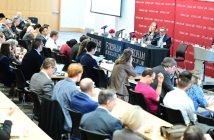Now that the Supreme Court has ended race-conscious admissions policies in higher education, what does that mean for Asian American communities?
Fordham Law’s Center on Asian Americans and the Law recently brought in a panel of experts to address the issue at a program titled, “The Past, Present, and Future of AAPIs and Education.”
The speakers noted that there is a long and complex legal history involving education and Asian American students. “We’ve gone from Asian students being turned away from schools because they weren’t white to the suggestion that there are too many Asians in certain schools,” said Denny Chin, a senior circuit judge and co-director of the Center on Asian Americans and the Law.
Ryan Y. Park, solicitor general of North Carolina who represented the University of North Carolina (UNC) in the SCOTUS case, said the Court relied on a series of misconceptions around how college admissions offices actually worked. “The majority opinion presumed that holistic admissions processes involved giving automatic preferences to certain races,” said Park. “And that is just not really how the process works, at least at UNC.”
Park also pointed out that that there was evidence in the record that Asian American applicants to UNC were not hurt but may even have benefited from their status. Given UNC’s and North Carolina’s regretful and not-so-distant segregated past, Park said “it seems unconscionable for the vision of our university not to reflect the present diversity of the people of North Carolina.”
The speakers pointed out that the Harvard/UNC decision could impact the consideration of race in other areas. “I think the reach of this is very broad,” said Eduardo M. Peñalver, president of Seattle University. “I think the resources behind advocacy on these issues are immense and the motivations are deep. How do you draw the line between this decision and, say, affirmative action in the employment context?”
Peñalver pointed to recent lawsuits targeting diversity fellowships at two law firms, Perkins Coie LLP in Dallas and Morrison & Foerster LLP in Miami, that were accused of discriminating against white applicants. Similar complaints have been made against diversity hiring programs at companies including Kellogg and video game company Activision Blizzard.
Peñalver remarked that the SCOTUS decision could have far-reaching impact in the future, “These efforts, across different domains of our society, to grapple with inequality of opportunity and historical injustice are just all, across the board, on the chopping block. I think the ambition here is to really restructure public life, and essentially to take us back to a different time.”
View more photos from the event below:





